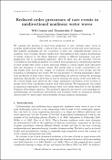| dc.contributor.author | Cousins, Will | |
| dc.contributor.author | Sapsis, Themistoklis | |
| dc.date.accessioned | 2016-03-03T17:27:56Z | |
| dc.date.available | 2016-03-03T17:27:56Z | |
| dc.date.issued | 2016-02 | |
| dc.date.submitted | 2015-11 | |
| dc.identifier.issn | 0022-1120 | |
| dc.identifier.issn | 1469-7645 | |
| dc.identifier.uri | http://hdl.handle.net/1721.1/101436 | |
| dc.description.abstract | We consider the problem of short-term prediction of rare, extreme water waves in irregular unidirectional fields, a critical topic for ocean structures and naval operations. One possible mechanism for the occurrence of such rare, unusually intense waves is nonlinear wave focusing. Recent results have demonstrated that random localizations of energy, induced by the linear dispersive mixing of different harmonics, can grow significantly due to modulation instability. Here we show how the interplay between (i) modulation instability properties of localized wave groups and (ii) statistical properties of wave groups that follow a given spectrum defines a critical length scale associated with the formation of extreme events. The energy that is locally concentrated over this length scale acts as the ‘trigger’ of nonlinear focusing for wave groups and the formation of subsequent rare events. We use this property to develop inexpensive, short-term predictors of large water waves, circumventing the need for solving the governing equations. Specifically, we show that by merely tracking the energy of the wave field over the critical length scale allows for the robust, inexpensive prediction of the location of intense waves with a prediction window of 25 wave periods. We demonstrate our results in numerical experiments of unidirectional water wave fields described by the modified nonlinear Schrödinger equation. The presented approach introduces a new paradigm for understanding and predicting intermittent and localized events in dynamical systems characterized by uncertainty and potentially strong nonlinear mechanisms. | en_US |
| dc.description.sponsorship | Naval Engineering Education Center (Grant 3002883706) | en_US |
| dc.description.sponsorship | United States. Office of Naval Research (Grant ONR N00014-14-1-0520) | en_US |
| dc.language.iso | en_US | |
| dc.publisher | Cambridge University Press | en_US |
| dc.relation.isversionof | http://dx.doi.org/10.1017/jfm.2016.13 | en_US |
| dc.rights | Creative Commons Attribution-Noncommercial-Share Alike | en_US |
| dc.rights.uri | http://creativecommons.org/licenses/by-nc-sa/4.0/ | en_US |
| dc.source | Sapsis | en_US |
| dc.title | Reduced-order precursors of rare events in unidirectional nonlinear water waves | en_US |
| dc.type | Article | en_US |
| dc.identifier.citation | Cousins, Will, and Themistoklis P. Sapsis. “Reduced-Order Precursors of Rare Events in Unidirectional Nonlinear Water Waves.” Journal of Fluid Mechanics 790 (February 11, 2016): 368–388. | en_US |
| dc.contributor.department | Massachusetts Institute of Technology. Department of Mechanical Engineering | en_US |
| dc.contributor.approver | Sapsis, Themistoklis | en_US |
| dc.contributor.mitauthor | Cousins, Will | en_US |
| dc.contributor.mitauthor | Sapsis, Themistoklis | en_US |
| dc.relation.journal | Journal of Fluid Mechanics | en_US |
| dc.eprint.version | Author's final manuscript | en_US |
| dc.type.uri | http://purl.org/eprint/type/JournalArticle | en_US |
| eprint.status | http://purl.org/eprint/status/PeerReviewed | en_US |
| dspace.orderedauthors | Cousins, Will; Sapsis, Themistoklis P. | en_US |
| dc.identifier.orcid | https://orcid.org/0000-0003-0302-0691 | |
| dc.identifier.orcid | https://orcid.org/0000-0001-7552-9062 | |
| mit.license | OPEN_ACCESS_POLICY | en_US |
